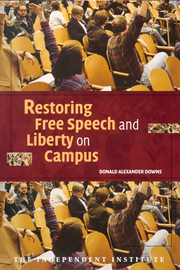During a trip to Berkeley in January, I purchased a bumper sticker from a street merchant on Telegraph Avenue. A relic of the Free Speech Movement of the ’60s, it said “Talk is Cheap. Free Speech Isn’t.” I remember thinking at the time about how the sticker’s meaning probably resonates more loudly outside than inside the University of California’s Sather Gate. After all, I was aware that my alma mater had witnessed many transgressions against free speech in recent years. As is well known, Berkeley is not alone in this regard.
My suspicions were confirmed a few weeks ago, when the Daily Californian (the student paper) ran conservative David Horowitz’s advertisement, opposing reparations for slavery. Though hard-hitting, the ad was not racist. Regardless, outraged student groups demanded recantation. Rather than using the occasion to engage the question of reparations or to talk about the pros and cons of free speech, the Daily Californian took the easy way out, avoiding the pressure by apologizing and promising to never run such a statement again. It is increasingly clear that the Free Speech Movement has given way to the Freedom From Speech Movement.
Giving way in the face of fierce pressure is all-too-human. But an uncomfortable truth simply will not go away: civil liberty and freedom can prevail only if individuals entrusted with their care are willing to act in a principled manner when pressure comes calling. For example, when a jury finds itself under intense social pressure to convict a defendant, no one would claim that it performs its constitutional or social duty if it yields to this force rather than considering only the guilt or innocence of the defendant under the law. Free speech has the same constitutional status as the right to a fair trial.
It is for this reason that the story of the Badger Herald is so inspiring. The Herald is one of two student papers at the University of Wisconsin, Madison—a school many consider the Berkeley of the Midwest - and is considered the mainstream paper on campus.
Last week, the Herald printed the Horowitz ad. Student protest erupted immediately. No doubt feeling empowered by the Berkeley precedent, activists demanded that the Herald issue a formal apology and a promise to publish such material never again. Everyone involved knew right away that a classic free speech showdown was at hand.
Two years ago, the Herald board surrendered when a large group, angry over a cartoon, took over the paper’s offices and refused to leave until the editors published an apology that satisfied the protestors. Such surrender had a predictable result: over the course of the next year, the paper fell into shellshock. But things improved last year under the leadership of Christopher Tenant. And this year, the Herald’s leaders vowed to be better prepared to deal with controversy if and when the crunch came.
Last semester, editorial page editor Hasdai Westbrook set the stage for the latest showdown by undertaking a conscientious campaign to publish thought provoking articles from across the political spectrum. For his efforts on the campus’s behalf, Westbrook had to endure several threatening complaints. But he did not yield.
On a broader front, in recent years a coalition of faculty and student activists have won several unprecedented civil liberty battles involving due process reforms and the abolition of speech codes and anonymous complaint boxes. The Herald’s staff has constantly interacted with this coalition. The institutional environment has swung decidedly in the free speech direction.
A free speech environment is important, but individuals at the crossroads of pressure still have to muster the courage to do the right thing. Last week, the new Herald board did precisely that. Led by editor-in-chief Julie Bosman and associate editor Alex Conant—and joined by Mike Harrison, Ethan Rouen, and Rebecca Vlamis—it voted 5-0 not to apologize for the Horowitz advertisement. In an editorial statement, the board affirmed its commitment to the First Amendment, and welcomed critics to write counter pieces in its pages.
Undeterred, activists held an intimidating rally in front of the Herald’s headquarters, demanding that the university administration punish the members of the board. Madison police had to stand before locked doors to protect the staff. But by now the Herald staffers were feeling the special strength that comes from being true to one’s intellectual conscience, so the heightened pressure only strengthened their resolve.
Though the controversy is far from over, thus far university administrative leaders have stated that the Herald has acted within its First Amendment rights. And the Herald has been avalanched with congratulatory letters from former staffers and supporters from across the country. Since appearing in the national media, Bosman has received more than 150 e-mails, only two of which have criticized the Herald’s position. To borrow words from Bruce Springsteen, the Herald has earned respect because it had the faith to stand its ground. Perhaps the mantle of the Free Speech Movement has passed to Madison.








